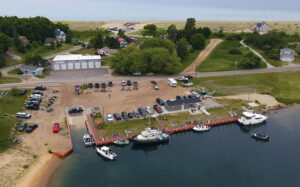Photo by Paul K. Petersen/Petersen Photography
Nestled on a Lake Superior natural harbor of refuge, petite Grand Marais is known as the eastern gateway to Pictured Rocks National Lakeshore, but the scenic spot in Michigan’s Upper Peninsula is a destination in its own right.
Long before 17th century French voyageurs Pierre Esprit Radisson, Medard Chouart and Sieur des Groseilliers traveled Lake Superior’s south shore, the Ojibwa called the region home. According to Radisson, the Native people respected the spirits they believed shaped the spectacularly carved and colored towering sandstone of the Pictured Rocks. Of their journey Radisson said, “We go along the coast, most delightful and wonderful. Nature has made it pleasant to the eye, the spirit and the belly.”
The French name Grand Marais translates to great marsh, but is interpreted here to reference the large, relatively shallow harbor. The natural resources of the area drew fur traders, including an outpost of John Jacob Astor’s American Fur Company. By 1805, the Michigan Territory was established, and earnest exploration of the Upper Peninsula began.
It wasn’t until 1861 that the first permanent settlement, a trading post, was built. Fishing and lumber industries followed, with a few mills shipping wood products and multiple fisheries sending a bounty of trout and whitefish around the lake. Grand Marais experienced modest growth until 1894, when the rail line arrived and logging camps were built to cut the area’s huge tracts of white pine.
It’s hard to imagine today, but in a short time there were 25 saloons, six churches, a dozen or more boarding houses, hotels, drugstores, general and specialty stores, an opera house, a hospital, a school and two newspapers serving the population of about 3,000. Large mills shipped tens of millions of feet of lumber each year. The good times came to an end in 1910, when the pine was exhausted and the logging operations and railway moved on.
With the rail service gone, a road was finally built for a means of reaching Grand Marais by land. The development of Michigan Highway 77 allowed travelers in their new-fangled motor cars to discover the lakeside village. Tourism, along with a resurgence in commercial fishing, became important to the revival of Grand Marais.
Only in Grand Marais
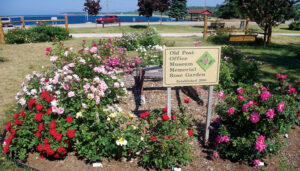 Among the early summer residents of Grand Marais were Chicagoans William Donahey, an illustrator and creator of The Teenie Weenies cartoon strip, and Mary Dickerson Donahey, a children’s book author. William’s Chicago Tribune strip, widely syndicated over a span of 50-plus years, featured 2-inch-tall people who lived in human-sized objects, such as a pickle jar.
Among the early summer residents of Grand Marais were Chicagoans William Donahey, an illustrator and creator of The Teenie Weenies cartoon strip, and Mary Dickerson Donahey, a children’s book author. William’s Chicago Tribune strip, widely syndicated over a span of 50-plus years, featured 2-inch-tall people who lived in human-sized objects, such as a pickle jar.
In 1926, the creative couple moved into a cottage on Grand Sable Lake that was a 16-foot-tall version of the pickle barrel featured in his popular stories. The cabin had a living room and kitchen on the first floor and bedroom upstairs. But after enduring a decade of fans invading their privacy to see the curiosity, the Donaheys gave up their retreat and the structure was moved into town, where it served as an ice cream stand and information booth. It has since been restored by the Grand Marais Historical Society as a museum, and a glimpse into The Teenie Weenies phenomenon.
The Historical Society also operates the Old Post Office Museum and Lightkeeper’s House Museum, Heritage Center at the library, and beautiful iris and rose gardens.
Rockin’ On
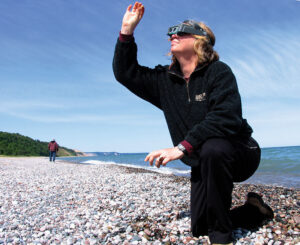 Aptly named Agate Beach, the stretch of Lake Superior shoreline in Grand Marais is a destination for rockhounds in search of the colorful, layered semi-precious gemstone. Karen Brzys, aka The Agate Lady, has written six books on minerals and operates the Agatelady Rock Shop, where she sells specimens and her stained glass art that incorporate slices of agates.
Aptly named Agate Beach, the stretch of Lake Superior shoreline in Grand Marais is a destination for rockhounds in search of the colorful, layered semi-precious gemstone. Karen Brzys, aka The Agate Lady, has written six books on minerals and operates the Agatelady Rock Shop, where she sells specimens and her stained glass art that incorporate slices of agates.
On Fridays throughout the summer months, Brzys delivers her lecture, “Understanding and Finding Agates,” and also conducts custom programs.
“My emphasis is on education,” she says, including a private class identifying different types of rocks and learning to “think like an agate,” with an excursion to the beach to find specimens.
“The interest in rockhounding has gone up significantly,” Brzys says, attributing some of it to people searching for outdoor activities in the COVID era. Whether the pickings include agates or just pretty rocks, she believes the meditative time spent on the Lake Superior shore is time well spent.
Grand Marais is also a popular spot for nighttime hunting of fluorescent sodalite, an ordinary looking gray rock that glows when under a UV light. Local gem and mineral dealer Erik Rintimaki discovered the first specimens several years ago and dubbed them Yooperlites. He conducts guided excursions to help in the hunt.
Note: Be sure when you’re hunting for stones that you’re in an area that allows you to take them home; otherwise, just enjoy the beauty of the rocks and thrill of the hunt, and then leave them where you find them.
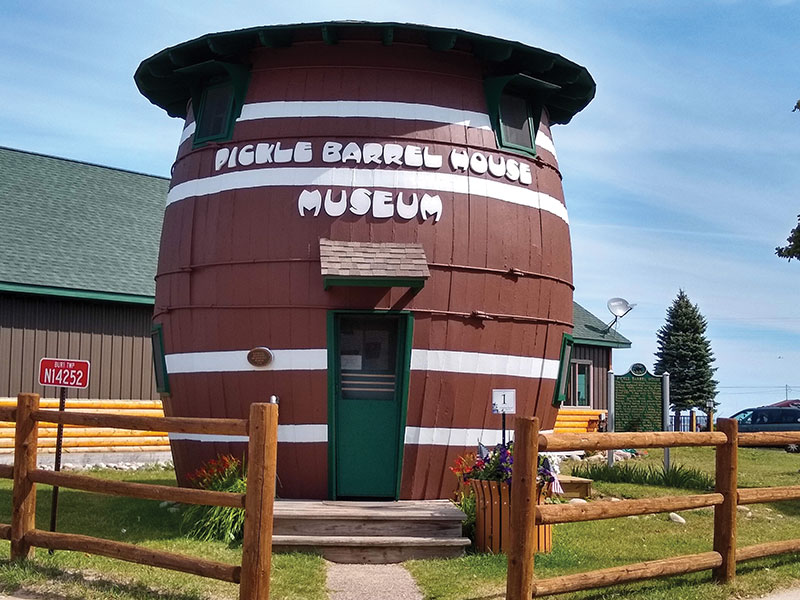
Photo Courtesy of Grand Marais Historical Society Facebook
Photo by Paul K. Petersen/Petersen Photography
Small Town, Big Welcome
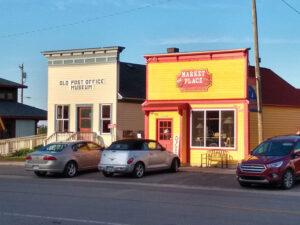 For a hamlet of only about 300 residents and a summer population of four or five times that, Grand Marais offers a busy schedule of events and amenities. Lodging ranges from motels and cabins to bed and breakfasts. Woodland Campground is right in town and on Lake Superior, and there’s backcountry and rustic camping at Pictured Rocks National Lakeshore.
For a hamlet of only about 300 residents and a summer population of four or five times that, Grand Marais offers a busy schedule of events and amenities. Lodging ranges from motels and cabins to bed and breakfasts. Woodland Campground is right in town and on Lake Superior, and there’s backcountry and rustic camping at Pictured Rocks National Lakeshore.
The Market Place sells the wares of local talent, as does Grand Marais Fisheries Farm & Mercantile, an eclectic shop a few miles out of town. Housed in a former fish smoking business, owner Toni Whaley strives to be “attainable and sustainable. We support our community with local artists and co-op foods.” You’ll find fresh eggs, baked goods, a curated selection of beer and wine, gifts and antiques and vintage items.
After decades behind a desk at administrative jobs in Ann Arbor, Jeannie Kain was looking for an opportunity to move “Up North.”
“I fell in love with Grand Marais Outfitter,” she says of her new business. Housed in a renovated 1890s building, it’s a year-round source for outdoor gear and supplies, and Michigan and U.P.-themed goods, including coffee and items by area artists.
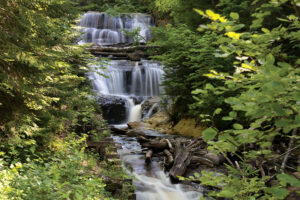 When visitors ask for tips on must-sees, Kain recommends her top pick at Pictured Rocks National Lakeshore, Sable Falls. “Just a mile from downtown, this beautiful natural waterfall flows right into Lake Superior,” she says. It’s an easy hike to a peek at the falls, but for the best view, climb 168 steps to the bottom — and back up — with breathtaking views the entire way.
When visitors ask for tips on must-sees, Kain recommends her top pick at Pictured Rocks National Lakeshore, Sable Falls. “Just a mile from downtown, this beautiful natural waterfall flows right into Lake Superior,” she says. It’s an easy hike to a peek at the falls, but for the best view, climb 168 steps to the bottom — and back up — with breathtaking views the entire way.
It’s also the starting point for the Grand Sable Dunes hiking trail. The massive, five-square-mile mountain of sand reaches about 300 feet above Lake Superior, and is one of the world’s best examples of perched dune systems.
Kain likes visitors to discover the area’s lumbering history at the Log Slide. “It’s a huge sand dune where the lumberjacks would literally roll the timber down to Lake Superior for processing at lumber mills or gathering to be placed on other means of transport,” she says.
The Pictured Rocks shoreline, with its 200-foot-high namesake walls and geologic formations like Miners Castle and Chapel Rock, stretches 42 miles from Grand Marais west to Munising. Beaches, dunes, waterfalls, inland lakes, streams and forests fill its 73,000 acres, making it a four-season destination for hikers, campers, snow sports enthusiasts and photographers.
“Up here it’s just so beautiful, no matter what the season,” Kain says.
Plain Difference
In stark contrast, just south of the splendor of Pictured Rocks is the desolate landscape of Kingston Plains. For miles, jagged tree stumps dot the ground covered with lichens, shrubs and scrubby trees. Until the late 1800s, old-growth white pine forests filled the land, but by 1909, more than 3,000 acres had been cleared. Multiple fires cooked the sandy soil and destroyed chances for new growth.
On a still day, the eerie silence is as vast as the plains. Writer Jim Harrison, a Michigan native, would retreat to his cabin near Grand Marais and clear his mind by walking for hours across Kingston Plains. The ravaged landscape is central to his novel “True North,” about a timber family who grew wealthy on the white pine they depleted.
The writer was famous for regaling locals and visitors at the Dunes Saloon/Lake Superior Brewing Company, where you can sip a house brew or root beer with whitefish straight from Lake Superior. Locals like breakfast at the Breakwall, Grand Marais Tavern pizza, Sherpa Shack for ice cream and the Iron Fox Grill food truck. Ellen Airgood, a baker and writer of U.P.-based novels (and, with her husband the former owner of Archie’s West Bay Diner), has a new venture selling her sweets from an airstream trailer-turned Uglyfish Baking Company — worth the drive to Deer Park, east of Grand Marais.
 Another female entrepreneur, Libby Whittington, serves coffee and baked goods from Stella, her 1966 Volkswagen bus. Her company, The Dream Bean Machine, includes a shop stocked with apparel, accessories and gifts, and she offers beach yoga classes in July and August.
Another female entrepreneur, Libby Whittington, serves coffee and baked goods from Stella, her 1966 Volkswagen bus. Her company, The Dream Bean Machine, includes a shop stocked with apparel, accessories and gifts, and she offers beach yoga classes in July and August.
“Grand Marais is beautiful and quiet most of the year. It’s a little piece of heaven, and not a lot of people are able to live here,” Whittington says, sounding a bit in awe of her own happy dream come true.
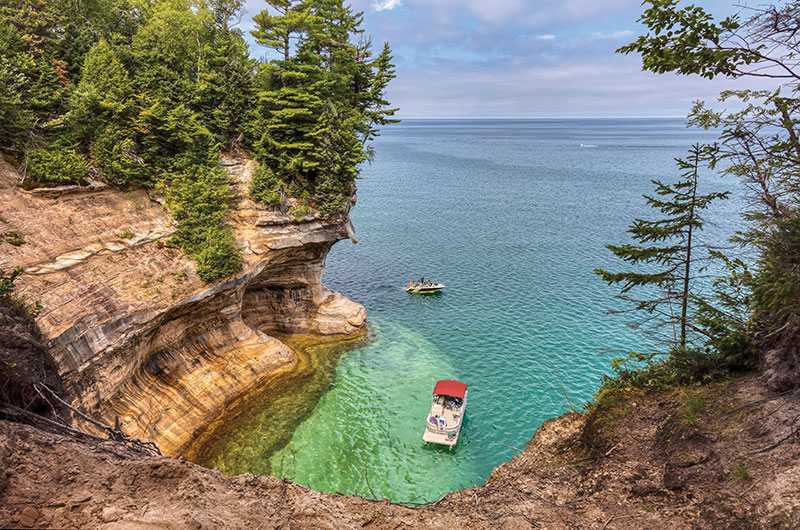
Photo by Mitgirl/Adobe Stock
2023 Calendar of Events
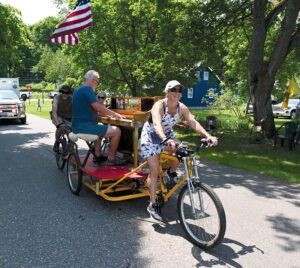
June 16-18
Seaplanes Splash-In on the Bay
seaplanepilotsassociation.org
July 4
Fourth of July Celebration with Fireworks
grandmaraismichigan.com
July 12-16
Great Lakes Sea Kayak Symposium
greatlakesseakayaksymposium.net
August 10-12
Grand Marais Music & Craft Festival
grandmaraismichigan.com
September 9-10
Grand Marais Rock & Mineral Show
grandmaraisrockandmineralshow.com
September 15
Munising Bay Cruisers Classic Car Show
facebook.com/MunisingBayCruisers
October 7
Color Tour Craft Show
grandmaraismichigan.com
November 24-25
Starry Starry Night
grandmaraismichigan.com
Photo by Paul K. Petersen/Petersen Photography


